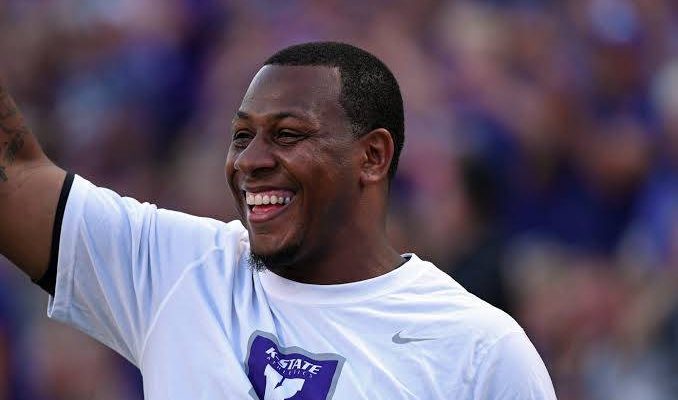Manhattan, KS – In a move that has sent ripples of excitement through the Kansas State University community, former Wildcats quarterback Michael Bishop has returned to the program as a member of the football staff, a full-circle moment for a player whose legacy helped define an era of Kansas State football. Bishop, who was a Heisman Trophy finalist in 1998 and is often credited with putting Kansas State on the national map, is back in Manhattan in a leadership and developmental role that is already being praised as a monumental boost for the Wildcats both on and off the field. His return is not just symbolic—it is a tangible asset to a program intent on regaining the national relevance it once enjoyed during Bishop’s heyday under legendary coach Bill Snyder. Fans of the program are rejoicing at the news, not only because of what Bishop accomplished as a player, but because of what he represents: perseverance, excellence, leadership, and loyalty to the program that helped shape him.
Bishop’s playing career at Kansas State was nothing short of electric. In just two seasons (1997 and 1998), he turned the Wildcats into a force to be reckoned with. Known for his rocket arm, quick feet, and ability to lead under pressure, Bishop passed for over 2,800 yards and rushed for more than 700 in 1998 alone. He led Kansas State to an 11-0 start and had the Wildcats one win away from a national championship game appearance. Though the team fell short in a heartbreaking double-overtime loss to Texas A\&M in the Big 12 Championship, Bishop’s efforts were enough to earn him runner-up honors in the Heisman voting, finishing behind only Texas running back Ricky Williams. That season remains one of the most storied in Kansas State history, and Bishop’s leadership and dynamic play were central to its success. His return to the program, now more than two decades later, feels like a spiritual reawakening of sorts—a nod to the glory days with an eye toward building new ones.
What makes Bishop’s return particularly powerful is the manner in which it bridges generations. Young players on the current roster weren’t alive when Bishop was making national headlines, yet the stories of his grit and explosiveness have lived on. Now, those stories will no longer be simply the stuff of legend—they will be taught, directly, from the man who lived them. Bishop’s role on the staff is focused on player development and mentoring, allowing him to draw on his extensive playing experience at the collegiate and professional levels. After Kansas State, Bishop had a stint in the NFL with the New England Patriots and later became a star in the Canadian Football League. His understanding of the quarterback position, as well as the mental and physical demands of the game, is expected to make an immediate impact on the Wildcats’ quarterback room and overall offensive identity. Coaches and insiders believe Bishop’s presence alone will elevate the competition level and work ethic of the team.
Bishop has always had a special bond with Kansas State, and he has returned to Manhattan several times over the years for alumni events, speaking engagements, and team reunions. But this time, it’s different. This time, he’s back for the grind. This time, he’s lacing up his metaphorical cleats again—not to throw touchdown passes, but to help the next generation of Wildcats believe in themselves the way he once believed in a team few outside of Manhattan thought could contend with college football’s elite. His presence on the staff is also a strong emotional boost to a community that has always revered its football heroes and embraced its past as a way to inspire the future. The Kansas State fanbase is intensely loyal, and the return of one of its greatest players feels like a collective homecoming celebration.
The impact of Bishop’s return isn’t confined to nostalgia or emotional significance—it has real recruiting and developmental implications. Already, reports indicate that Bishop has made a strong impression on the young quarterbacks in the program. Several high school prospects, especially those considering Kansas State among their options, have spoken publicly about how meaningful it is to see a former Heisman finalist involved in the program’s day-to-day operations. Bishop adds instant credibility to Kansas State’s pitch to recruits. He’s living proof of what can happen when talent, opportunity, and mentorship intersect. More importantly, he represents a continuation of Kansas State’s rich football tradition in an era increasingly dominated by transient players and coaches.
Current head coach Chris Klieman, who has built a strong foundation since taking over the program, was enthusiastic and proud to bring Bishop back into the fold. Klieman has repeatedly emphasized the importance of connecting the current team to the program’s storied past, and there may be no better living symbol of that past than Michael Bishop. The two men, while having very different styles and coaching pedigrees, share a commitment to player development, accountability, and team-first culture. For Klieman, having Bishop in the building provides another layer of leadership that will be invaluable throughout the season.
Bishop’s return has also energized former teammates and fellow Kansas State alumni. Many of them have taken to social media to express their pride and joy at seeing their former leader back on the sidelines. The buzz surrounding Bishop’s involvement has even prompted renewed discussions among boosters and alumni about increased donations and long-term facility investments. While those conversations are ongoing, it’s clear that Bishop’s return has sparked a broader re-engagement among stakeholders in the program. And in college football, where culture, tradition, and identity often play as large a role as playbooks and recruiting, those intangibles can become powerful levers for growth.
For Bishop himself, the decision to return to Kansas State wasn’t about legacy or personal gain. It was about giving back. It was about fulfilling what he sees as a lifelong responsibility to the program that believed in him when others didn’t. Bishop has often spoken about how Coach Bill Snyder changed his life, how Kansas State offered him a chance to rise from obscurity to national prominence, and how the university and the community became family. His return is a manifestation of that gratitude and a clear indication that he views Kansas State not as a stepping stone in his career, but as a lifelong calling. His message to players is clear: greatness requires discipline, commitment, and faith—and there’s no better place to learn those lessons than at Kansas State.
Fans can already feel the shift. There’s a buzz in the air that hasn’t been felt in years. Season ticket sales are ticking upward. Social media engagement is booming. And perhaps most importantly, the players themselves are walking with a renewed sense of purpose. Bishop’s work has already begun, whether it’s breaking down film with quarterbacks, encouraging linemen during weight training, or simply sharing his story with players over lunch. His goal isn’t just to produce wins—it’s to build men, to cultivate leaders, and to instill the kind of belief that carried him from Blinn Junior College all the way to New York City as a Heisman finalist.
While Bishop’s name will always evoke memories of dazzling runs, pinpoint throws, and game-winning moments, his new chapter at Kansas State is about something even deeper. It’s about legacy. Not the kind measured in stats or trophies, but the kind measured in impact, in relationships, in lives changed. He may no longer be the one under center, but his influence will be felt on every snap, in every huddle, in every meeting room. He is not just returning to Kansas State—he is reinvesting in it, restoring it, and reimagining what it can become. For a program looking to reassert itself among college football’s elite, the timing could not be more perfect.
As the Wildcats prepare for a new season, with high expectations and the ever-present pressure of the Big 12, Bishop’s presence offers a stabilizing force. He understands what it takes to win at Kansas State, because he’s done it. He knows the kind of toughness required to thrive in a conference full of giants. And he understands better than anyone how much the people of Manhattan, Kansas, care about their football. Bishop doesn’t need to learn the culture—he helped create it. And now, he’s back to help build the next great chapter. His story, already legendary, is still being written. And the next generation of Wildcats are fortunate enough to be co-authors of it.



